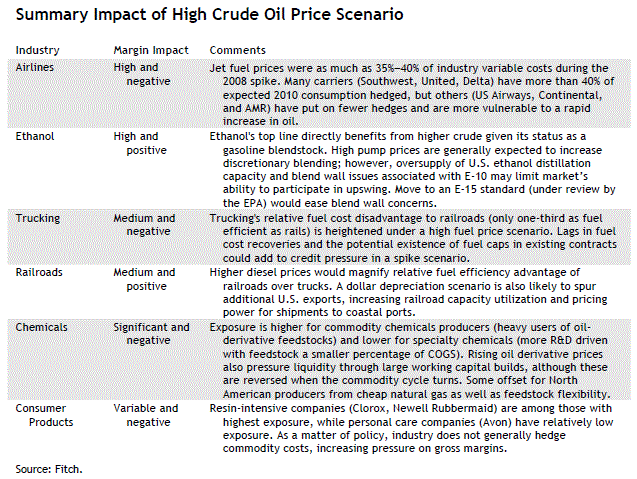The effect of rising oil prices is continuing to attract scrutiny. Credit ratings agency Fitch is now considering which sectors would be most vulnerable - and which would benefit — if/when crude oil prices reach $150. Not surprisingly, airlines are among those worst affected, although this is partly due to their limited hedging.
Other vulnerable sectors are: trucking, chemicals (though this could be mitigated somewhat by natural gas), and some consumer goods companies. Clear winners would be ethanol companies and rail operators, which could both benefit from attempts to save on crude oil input costs.
More details after the jump.
Fitch analysts also point out that the degree to which companies have already responded to the 2007-08 oil price run-up — cutting costs and improving flexibility — will affect their credit potential. But this won’t mean the effect of another spike is softened; in fact, Fitch says, the “low-hanging fruit has already been plucked”.
Trucking is particularly complicated, because it faces more challenges passing on fuel price hikes to its customers. Although fuel surcharges are built into the structure, Fitch’s analysts write, there is a lag in implementing changes:
These lags can vary from one week to several months, depending on the nature of the negotiated agreement with the shipper, and can therefore result in lower margins and potential credit stresses in periods when fuel prices are rising rapidly. While most Fitch rated entities in the transport space are investment grade and have the balance sheets to withstand the stresses that a period of under-recovered fuel costs could create, this could become more of an issue in the case of an especially large or prolonged fuel price increase, or in the case of lower credit quality firms.
In consumer industries, Fitch analysts believe the effects would vary between companies they cover, but they point out that in 2008 both Kimberly-Clark and Colgate issued profits warnings based on higher commodities costs. Rising commodities prices were cited as a reason for a possible downgrade in the case of Kimberly-Clark and Clorox in 2008, they say....MORE
Wednesday, May 5, 2010
"$150 oil: Who will be worst hit, and who will benefit?"
From the Financial Times' EnergySource blog:
